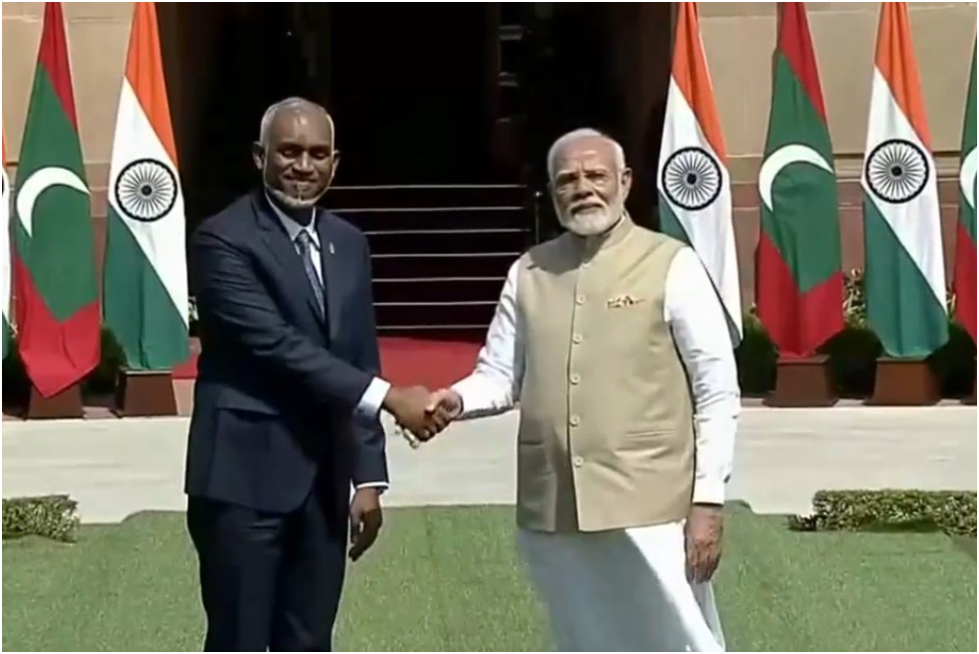
Correct Word | The Maldives Returns To India, Its All-Weather Friend After A Detour

Concerns over the future of bilateral relations between the maldives and india were immediately voiced when Mohamed Muizzu took office as president in november of last year, driven by a strong anti-India campaign.
As Muizzu vigorously pursued his india Out agenda, denouncing what he saw as excessive indian influence in the archipelago, the two countries—which have had a close relationship since india was one of the first to recognise Maldivian independence from british colonial rule in 1965—saw a noticeable decline in diplomatic warmth.This rhetoric went beyond simple electioneering; soon after becoming power, Muizzu called for the evacuation of 80 indian soldiers who had been deployed to provide the Maldivian government with a Dornier aircraft and two rescue and surveillance helicopters. In addition, a few months into his president, he announced that the maldives would not renew a deal signed under Ibrahim Solih that allowed india to carry out hydrographic surveys, preferring to do so on its own.
The issue was made worse by Muizzu's recent trip to china, which strengthened bilateral ties and resulted in a comprehensive strategic cooperative alliance that included a defence cooperation deal. At the same time, the maldives allowed a Chinese research ship to dock in its seas, which alarmed india because it was thought to be a "spy ship" that was there to collect intelligence for Chinese submarine operations in the area. Furthermore, in june of this year, a Maldivian parliamentary committee decided to review three agreements made with india under Ibrahim Solih's presidency, including a plan to build a naval base, on the grounds that they "undermined the sovereignty and independence of the Maldives."The biggest setback to relations, though, came when three Maldivian ministers disparaged prime minister Narendra Modi, which led to a Boycott maldives movement on indian social media. Even though these officials were fired, their comments caused a great deal of indignation among Indians, who make up a sizable percentage of Maldivian tourists. As a result, the island nation lost an estimated $150 million in revenue over the previous year and saw a drop of 50,000 visitors.The relationship between india and the maldives has significantly improved despite the prior conflicts. In keeping with his prior anti-Indian sentiments, President Muizzu defied convention after winning office by not visiting india for the first time. india has continuously shown itself to be the "first responder" in times of crises, as prime minister Modi put it, but urgent economic realities have compelled him to reconsider his stances. When Muizzu made his first official visit to New delhi in early october of this year, the maldives was experiencing a serious budgetary crisis, with a $8 billion external public debt and declining foreign exchange reserves.
The Maldives' concerning debt-to-GDP ratio of 11% led credit rating agencies such as moody's and Fitch to downgrade the country, while the international Monetary Fund expressed concerns about the possibility of severe debt distress and called for immediate policy changes.
Muizzu looked to india for support as he attempted to avert an economic catastrophe like to that of Sri Lanka. When the maldives was about to become the first country to default on Islamic bond repayments, india intervened to save the country a month before his visit. The bank of india-Latest Updates, Photos, Videos are a click away, CLICK NOW">state bank of india promptly lent $50 million, echoing similar assistance given in May. In an attempt to put the past behind them and win crucial assistance from a loyal ally, President Muizzu told the BBC, "India is fully aware of our fiscal situation and, as one of our largest development partners, will always be prepared to alleviate our burdens."
President Muizzu's october visit to india was a huge success, as expected, and the two countries' relationship was upgraded to a Comprehensive Economic and Maritime Security Partnership. india offered $400 million in financial aid and a Rs 3,000 crore currency swap deal to help the maldives overcome its economic vulnerabilities. The goal was to support the archipelago's diminishing foreign exchange reserves. New infrastructure projects and talks over a free trade deal were announced at the end of the visit. In an effort to improve the Maldives' experience for indian tourists, President Muizzu has also started the process of introducing India's Unified Payments Interdata-face (UPI).
In addition to being crucial for regional security, the maldives is also strategically essential for india, especially as china looks to expand its influence in this economically precarious country. A key component of Beijing's Belt and Road Initiative, which many observers believe represents a larger Chinese plan to encircle india, is the Maldives. At first, President Muizzu's administration was characterised by a pronounced inclination towards china and a hostile attitude towards India. He now seems to acknowledge, nevertheless, that india has continuously supported its neighbour in times of need.
India's Neighbourhood First and SAGAR (Security and Growth for All in the Region) policies heavily rely on the Maldives. The maldives should not follow Sri Lanka's path, which has become indebted as a result of Chinese investments, as this would be detrimental to both countries. In a significant change from his previous stance, President Muizzu declared in october that the maldives will not take any steps that might jeopardise India's security, acknowledging india as a valued friend and partner. As a result, India-Maldives relations have been redata-aligned by similar interests and geographical, cultural, and historical linkages, opening the door to a more secure, wealthy, and stable future for both nations as well as the larger region.

